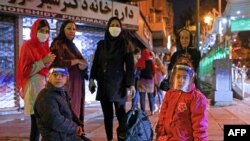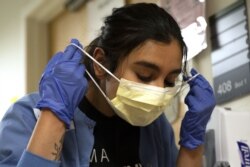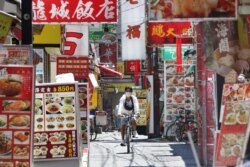An early morning earthquake in Iran has dealt a blow to the country's struggle to combat the coronavirus. Thousands of people took to the streets of Tehran, the capital, early Friday without observing the social distancing measures designed to prevent the spread of the disease. At least two people are reported to have died in the temblor, which Reuters reported had a magnitude of 5.1.
Australia announced a three-step plan Friday for its gradual re-opening after closing down to stop the spread of the virus.
As individual U.S. states continue to struggle to obtain COVID-19 tests for their residents, the White House has announced that President Donald Trump and Vice President Mike Pence will now be tested every day after the president’s valet tested positive for the virus. Before the valet fell ill, the two U.S. leaders were tested once a week.
The U.S. was bracing Friday for the release of the government’s official unemployment figures. Economists speculate the figure could be as high as 16 percent, following the job losses millions have faced following the outbreak of the coronavirus.
Up to 44 million people in Africa could come down with the coronavirus and 190,000 will die if the virus is not contained, the World Health Organization said.
A new WHO report looked at 47 countries on the African continent. It said while the rates of transmission in Africa would be slower than in other parts of the world during the pandemic’s first year, COVID-19 in Africa could “smolder” for a long time in what the report called hot spots.
“COVID-19 could become a fixture in our lives for the next several years unless a proactive approach is taken by many governments in the region,” said Dr. Matshidiso Moeti, WHO Africa regional director. “We need to test, trace, isolate and treat.”
If little or nothing is done, Moeti said, the medical capacity across Africa would be “overwhelmed” and added that curbing a largescale outbreak is far costlier than the ongoing preventive measures governments are undertaking to contain the spread of the virus.
United Nations Secretary-General Antonio Guterres said the U.N. is boosting its appeal for aid to help some of the world’s poorest countries fight the coronavirus by billions of dollars, saying Thursday that $6.7 billion is needed.
The World Bank on Thursday approved $506 million in emergency loans to Ecuador, which is grappling with one of Latin America’s worst outbreaks. The approval comes just days after the International Monetary Fund gave its backing to $643 million in aid to Ecuador.
The head of the U.S. National Institutes of Health told a Senate committee Thursday that the agency has teamed up with private industry to create and distribute technology that he said can test millions of people a week by the end of the summer, before the flu season starts.
“I must tell you, senators, that this is a stretch goal that goes well beyond what most experts think will be possible,” Francis Collins said. “I have encountered some stunned expressions when describing these goals and this timetable to knowledgeable individuals. The scientific and logistical challenges are truly daunting.”
But Collins told the lawmakers that he is optimistic because of what he calls "the track record of American ingenuity.”
Some health experts say if the coronavirus outbreak has not waned by the start of the usual flu season, or if there is a second wave of COVID-19, it would prove to be a tremendous challenge for the health system.
Those experts also say the U.S. may need to carry out a million tests a day to successfully isolate the virus.
In California, where the first part of a four-phase plan to reopen the state’s economy begins Friday, Gov. Gavin Newsom said the community spread of the virus in California began in a nail salon.
“I’m very worried about that,” Newsom said Thursday without giving details on exactly where the salon is.
Officials suspect it is in Solano County, between San Francisco and Sacramento.
Community spread is when someone catches the coronavirus without having known contact with another victim.
Health experts say places such as nail salons and gyms, where people come in close contact with one another, are considered to be high-risk businesses, although some have started to reopen in other states. Newsom has not said when they can reopen in California.
Frontier Airlines will be the first major U.S. air carrier to take the temperature of all passengers and crew who board its planes. Starting June 1, anyone with a temperature of 38 degrees Celsius or higher will not be allowed to fly but could be rebooked on a later flight after a rest period.
Several other airlines have already mandated face coverings for passengers and crew.
An editorial in the prestigious New England Journal of Medicine said a new study shows no evidence the malaria drug hydroxychloroquine is an effective coronavirus treatment.
“It is disappointing that several months into the pandemic, we do not yet have results from any strict tests of the drug,” doctors wrote.
President Donald Trump has pushed the drug as a COVID-19 treatment. But the Food and Drug Administration said it potentially has some serious side effects that could be fatal.
Also Thursday, South African Breweries, one of the world’s largest, said it may have to spill out 400 million bottles of beer because the country has banned the sale of alcohol as part of its COVID-19 fight.
South Africa temporarily stopped the sale and transport of alcohol in March, saying the medical community has its hands full with coronavirus and cannot deal with alcohol-related illness and accidents at this time.
South African Breweries said if it cannot get government permission to move the beer from its brewery to special storage facilities, it will have to destroy 130 million liters of suds, costing $8 million and maybe putting as many as 2,000 people out of work.







